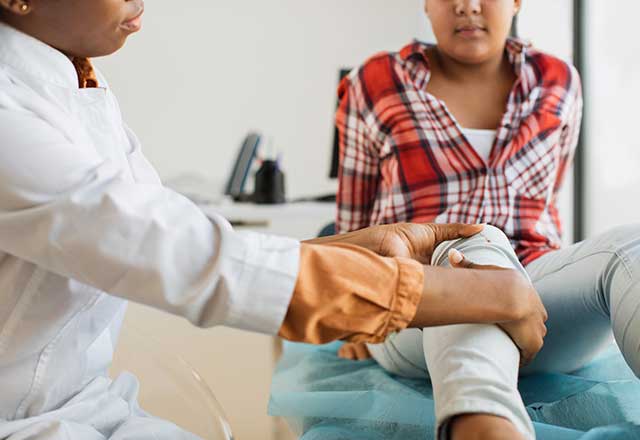Clinical Trial: Experimental Procedure for Children With Knee Cartilage Defects

In this study, researchers are evaluating an experimental treatment for knee cartilage defects called membrane-induced autologous chondrocyte implantation (MACI). Cartilage-forming cells are extracted from the knee, processed in a lab and implanted in the damaged area to help with cartilage repair. The study is comparing this treatment to microfracture surgery, which is the current standard of care for minor cartilage damage. Both treatments have been tested in adults and are considered safe and effective, but we need more data to compare the results of these treatments in children.
Study Overview
- Study name: A Study of MACI in Patients Aged 10 to 17 Years With Symptomatic Chondral or Osteochondral Defects of the Knee (PEAK)
- Study ID: NCT03588975
- Principal investigator: R. Jay Lee, M.D.
- Trial phase: Phase 3
- Eligibility criteria: children age 11-17 with knee cartilage defects
- Clinic location: Johns Hopkins Children's Center in Baltimore, MD
- Total participants: 15
- Compensation: up to $440
- How to participate: please email Gabrielle Reichard at greicha1@jhmi.edu
- Learn more on ClinicalTrials.gov
What to Expect if Your Child is Selected
Once your child is selected for the study, he or she will have a minimally invasive surgery called knee arthroscopy to assess the cartilage damage, take cartilage samples and confirm eligibility for the study. The doctors will ensure that the type of cartilage damage your child has can be treated with either MACI or microsurgery.
The procedure your child gets is assigned at random.
- If your child is getting microsurgery, it will be done during the arthroscopy.
- If your child is getting MACI, it will be done 12 weeks after the arthroscopy.
Overall, you may expect:
- 7-8 visits to the hospital/study clinic
- 3 follow-up phone calls (15, 18, and 21 months after the treatment)
Who Can Participate
A participant must meet all three criteria:
- Children age 10 to 17
- Diagnosed with a joint cartilage defect in the knee that causes symptoms, such as knee pain
- Not pregnant or breastfeeding
View additional eligibility criteria. This study is not recruiting healthy volunteers.
Benefits and Risks
We cannot guarantee any benefits as a result of taking part in this research study. The study team will discuss the risks associated with taking part in this study.
